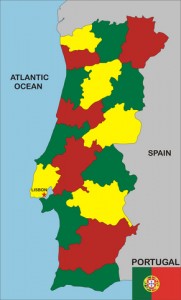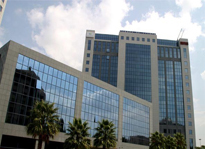
[Last Updated April 2023] A guide to serviced offices and office space to rent in Lisbon as well as general information that may be useful if you are thinking of renting office space in the city.
For further offices information or to search office space for rent in Lisbon just click. Or contact us for any other query.
History & Geography
Lisbon is not only the capital of Portugal but one of the most iconic and popular cities in Europe. Situated in southwest Portugal on the mouth of the Tagus River, Lisbon is the westernmost capital city in mainland Europe and due to its physical setting, also one of the most idyllic. Most believe that Lisbon and its surrounding area were first settled by the Phoenicians and used as a trading post and base to provision their ships. However, the first time the city is mentioned definitively, is as a settlement in the Roman province of Lusitania, however, at this point, it was called Olissipo by the Romans. After the fall of the Roman Empire, the city was ruled by varying Germanic tribes until 711 BCE when the city was captured by Muslim forces. Much of the Muslim influence can be seen in the city to this day, especially in the quarter of Alfama. In one of the most significant events in the history of the city, Lisbon was conquered in 1147 by Afonso I of Portugal. After this, the city stayed in Christian hands and most of the Muslims were expelled and mosques were destroyed. During the Middle Ages, the city grew and became an important trading post and, in 1255, became the new capital of the Portuguese territory. The 16th century was a golden age for Lisbon, as it benefitted from being a hub of trading between Europe, Africa, India and the Far East. In 1755 however, the city was completely devastated by an earthquake and the resulting tsunami. Thousands were killed and vast sections of the city had to be completely rebuilt. The 19th century saw Lisbon expand and modernise on the back of industry and commerce, and despite being sacked by Napoleon Bonaparte, the city grew, as did its population. In the early 20th century, Lisbon was the centre of the coup that formed the Portuguese Republic, and it also founded its first university. The city was neutral during WWII and afterwards continued to be modernised, with many of its neighbourhoods undergoing significant renovation and reconstruction. Today the city is one of the most modern in Europe.
Economy
Perhaps unsurprisingly Lisbon and its surrounding region are the wealthiest in Portugal and produce 45 per cent of Portugal’s GDP. The city has a strong knowledge and services economy as well as an active seaport. Financial services are playing an increasingly important role in the economy of the city, as is the technology sector. Lisbon also functions as Portugal’s main media centre, and all country’s leading TV and radio networks and major newspapers are based in the city. The south bank of the Tagus River is Lisbon’s industrial zone and includes industries such as shipbuilding, steel, textiles and oil refineries. Lisbon has planned several major construction projects for the future, such as a new airport, a new bridge, and a major expansion of its subway system. Given its beauty, climate, history and architecture, Lisbon has also become one of the most popular cities in Europe for tourists, and tourism is rapidly becoming a major industry in the city.
The annual technology conference, WebSummit, has been held in Lisbon since 2016. Partners of the conference include Fortune 500 companies, government entities and venture capital funds.
Speakers at the conference over the years have included Bill Gates, Tony Blair, Elon Musk, Stephen Hawking and Edward Snowden, and, in 2022, attracted over 70,000 attendees and over 2,000 start-ups.

Tourism
Tourists come to Lisbon mainly for its ambience and climate. Due to its southern geography, the city has cool, mild winters and sunny summers. Lisbon is also full of unique and inspiring architecture, making it ideal for wandering visitors. Tourists can see many schools, such as Romanesque, Gothic, Manueline, Baroque, Modern and Post-modern scattered about the city. Long, sweeping boulevards crisscross the city and majestic squares are seen everywhere. Alfama is the oldest district of the city, and home to lots of Arab architecture and also pubs featuring the traditional Portuguese style of music, Fado. The heart of the city is the Baixa district, renowned for its shopping but also for the squares the Praca do Comercio and the Rossio. For those seeking nightlife, the Alcantara district is full of pubs and discos, insulated from the rest of the city by a surrounding industrial quarter, they can be as loud as they please, and the area is popular with the youth of the city.
Transport
Lisbon has an extremely far-reaching and modern transportation network. Its main component is the Lisbon Metro, which connects the city centre with the upper and eastern districts and the outlying suburbs. An expansion project in the 2010s connected it to the airport with trips taking just over 30 minutes. A more traditional form of transport is Lisbon’s trams, called americanos by the Portuguese as they were first imported from America in the 19th century. A few of these can still be seen trundling around Lisbon’s streets, though they are mainly used by tourists. To cross the Tagus River, one can use the ferry, which operates from several different points and is also a popular trip with tourists. For air transport, Lisbon relies on the Portela Airport, which is located within the city limits and connects Lisbon to major cities in Europe, the US and Africa.

Office space to rent in Lisbon
In 2012, it was established that Portugal’s economy had been one of the hardest hit in Europe by the economic crisis and the recession that followed. Though the country received a bail-out, the government warned that tough austerity measures would be put in place for the next few years in order to reduce the country’s deficit.
Its unemployment rate had crept to over ten per cent for the first time in eight years.
According to CB Richard Ellis at the time, the average supply of new office space in Lisbon over the past six years was around 74,000 square metres per years.
Yet, despite the country’s economic plight, in 2011, 14 new projects, totalling over 100,000 square metres of office space were completed.
2010 had also seen demand for office space rise by 44 per cent on the 2009 figure. However, demand was still fairly low, which has put downward pressure on rents and resulted in incentives such as longer free rent periods.
Lisbon’s central business district (CBD) still had the largest supply of office space. The CBD had a vacancy rate of three per cent at the end of 2012 and the average rent in the CBD was 17 EUROs per square metre per month.
In that year, the Western Corridor of the city and the Parque das Nacoes had the most office space available and had seen the construction of major office developments recently.
More than a decade later, and following another global economic crisis in the pandemic, Lisbon showed continued positive signs of strength.
In 2022, the take-up of space through office lettings was a record high at 272,000 square metres. This number was bolstered by a record 3rd quarter which saw 79,569 square metres transacted – the strongest 3rd quarter ever recorded.
The most popular locations for office deals were the Prime CBD (Zone 1), Western Corridor (Zone 6), Parque das Nações (Zone 5), and the New Office Zones (Zone 3).
At the end of 2022, vacancy rates had dropped to 8.2% and prime office rents in CBD (Zone 1) were at 27 EUROs per square metre per month.
The Allo Project in the Riverside & Historic Zone (Zone 4) is set to bring approximately 35,000 square metres of prime office space to the market on completion.
Other office building projects in the pipeline include the EXEO – Aura which will deliver 16,500 square metres in 2024 and the Entrecampos Project which will deliver 98,000 square metres of office space in 2025.
There are also several serviced office providers in Lisbon made up of local operators as well as global flexible workplace providers such as Regus and Second Home
These provide flexible alternatives to renting office space on traditional leases with less onerous occupational terms and with all-inclusive pricing.
The fully-fitted workspace options that are offered include private serviced office suites, managed offices and corporate coworking membership plans such as desk passes.
They also offer meeting rooms, conference rooms and on-demand collaboration spaces for in-person working for hybrid working teams.
We carry out a free office space search and our advisory and acquisition services are also free, always. Our Lisbon office space brokers and agents are globally regulated by the Royal Institution of Chartered Surveyors (RICS) ensuring the highest standards of commercial property advice and service at all times. We look forward to helping you find the best office space for rent for your business.

The Office Providers are Regulated by the Royal Institution of Chartered Surveyors (RICS)